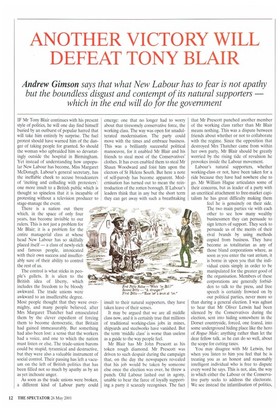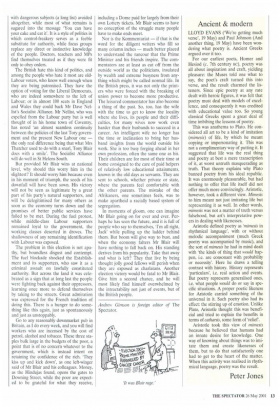ANOTHER VICTORY WILL DEFEAT TONY BLAIR
Andrew Gimson says that what New Labour has to fear is not apathy
but the boundless disgust and contempt of its natural supporters — which in the end will do for the government
IF Mr Tony Blair continues with his present style of politics, he will one day find himself buried by an outburst of popular hatred that will take him entirely by surprise. The fuel protest should have warned him of the danger of taking people for granted. So should the woman who upbraided him so devastatingly outside the hospital in Birmingham. Yet instead of understanding how unpopular New Labour has become, Miss Margaret McDonagh, Labour's general secretary, has the ineffable cheek to accuse broadcasters of 'inciting and colluding with protesters': one more insult to a British public which is thought so spineless that it is incapable of protesting without a television producer to stage-manage the event.
There is a nation out there which, in the space of only four years, has become invisible to our rulers. This is not just a problem for = Mr Blair: it is a problem for the -entire managerial class at whose head New Labour has so skilfully placed itself — a class of newly-rich and famous people, intoxicated with their own success and insufferably sure of their ability to control the rest of us.
The control is what sticks in people's gullets. It is alien to the British idea of liberty., which includes the freedom to be bloody awkward. The trade unions were awkward to an insufferable degree. Most people thought that they were overmighty, and many people believed, after Mrs Margaret Thatcher had emasculated them by the clever expedient of forcing them to become democratic, that Britain had gained immeasurably. But something had also been lost: a sense that the workers had a voice, and one to which the nation must listen or else. The trade-union barons could be stupid, tyrannical and destructive, but they were also a valuable instrument of social control. Their passing has left a vacuum on the left of British polities that has been filled not so much by apathy as by an as yet inchoate anger.
As soon as the trade unions were broken, a different kind of Labour party could
6141K1 (4.1t,r
emerge: one that no longer had to worry about that tiresomely conservative force, the working class. The way was open for unadulterated modernisation. The party could move with the times and embrace business. This was a brilliantly successful political manoeuvre, for it enabled Mr Blair and his friends to steal most of the Conservatives' clothes. It has even enabled them to steal Mr Shaun Woodward and foist him upon the electors of St Helens South. But here a note of self-parody has become apparent. Modernisation has turned out to mean the reintroduction of the rotten borough. If Labour's leaders think that in any but the short term they can get away with such a breathtaking insult to to their natural supporters, they have taken leave of their senses.
It may be argued that we are all middle class now, and it is certainly true that millions of traditional working-class jobs in mines, shipyards and steelworks have vanished. But the term 'middle class' is worse than useless as a guide to the way people feel.
Mr Blair has Mr John Prescott as his token rough diamond. Mr Prescott was driven to such despair during the campaign that, on the day the newspapers revealed that his job would be taken by someone else once the election was over, he threw a punch. Old Labour lashed out in agony, unable to bear the farce of loyally supporting a party it scarcely recognises. The fact that Mr Prescott punched another member of the working class rather than Mr Blair means nothing. This was a dispute between friends about whether or not to collaborate with the regime. Since the opposition that destroyed Mrs Thatcher came from within her own party, Mr Blair should be greatly worried by the rising tide of revulsion he provokes inside the Labour movement.
Labour's natural supporters, whether working-class or not, have been taken for a ride because they have had nowhere else to go. Mr William Hague articulates some of their concerns, but as leader of a party with an uncritical attachment to free-market capitalism he has great difficulty making them feel he is genuinely on their side. The two main parties vie with each other to see how many wealthy businessmen they can persuade to sign letters of support. They seek to persuade us of the merits of their rival brands by using methods copied from business. They have become as totalitarian as any of those bland corporations where, as soon as you enter the vast atrium, it is borne in upon you that the individual exists simply in order to be manipulated for the greater good of the organisation. Members of these corporations are generally forbidden to talk to the press, and free speech is certainly frowned on by our political parties, never more so than during a general election. I was aghast to hear that Mr Oliver Letwin had been silenced by the Conservatives during the election, sent into hiding somewhere in the Dorset countryside, forced, one feared, into some underground hiding place like the hero of Rogue Male; anything rather than let the dear fellow talk, as he can do so well, about the scope for cutting taxes.
You may disagree with Mr Letwin, but when you listen to him you feel that he is treating you as an honest and reasonably intelligent individual who is free to dispute every word he says. This is not, alas, the way in which either the Labour or the Conservative party seeks to address the electorate. We see instead the infantilisation of politics, with dangerous subjects (a long list) avoided altogether, while most of what remains is sugared into the message 'You can have your cake and eat it'. It is a style of politics in which control-freakery serves as a feeble substitute for authority, while focus groups replace any direct or instinctive knowledge of the people. Doctors, teachers and MPs find themselves treated as if they were fit only to obey orders.
The British hate this kind of politics, and among the people who hate it most are oldLabour voters, who know well enough when they are being patronised. They have the option of voting for the Liberal Democrats, who are indeed somewhere to the left of Labour; or in almost 100 seats in England and Wales they could back Mr Dave Nellist's Socialist Alliance. Mr Nellist, who was expelled from the Labour party but is well thought of in his home town of Coventry, has noted 'an almost seamless continuity between the policies of the last Tory government and the present New Labour one — the only real difference being that what Mrs Thatcher used to do with a snarl, Tony Blair does with a smile'. The Socialist Alliance will do well in St Helens South.
But provided Mr Blair wins at national level, why should this worry him in the slightest? It should worry him because even in his moment of triumph, the seeds of his downfall will have been sown. His victory will not be seen as legitimate by a great part of his party's natural supporters, and will be delegitimised for many others as soon as the economy turns down and the promises of better public services have failed to be met. During the fuel protest, while middle-class Labour supporters remained loyal to the government, the working classes deserted in droves. The shallowness of any remaining identification with Labour was exposed.
The problem in this election is not apathy, but boundless disgust and contempt. The fuel blockade shocked the Establishment and its supporters, who saw it as a criminal assault on lawfully constituted authority. But across the land it was celebrated as a sign that at long last the people were fighting back against their oppressors, learning once more to defend themselves by taking to the streets. Great admiration was expressed for the French tradition of doing this. There is a hunger to do something like this again, just as spontaneously and just as unstoppably.
Go to any reasonably downmarket pub in Britain, as I do every week, and you will find workers who are incensed by the cost of petrol, alcohol and tobacco. These three staples bulk large in the budgets of the poor, a point that is of no concern whatever to the government, which is instead intent on retaining the confidence of the rich. 'They kiss up and kick down', as one left-winger said of Mr Blair and his colleagues. Money, as the Hindujas found, opens the gates to Downing Street, while the poor are expected to be grateful for what they receive, including a Dome paid for largely from their own Lottery tickets. Mr Blair seems to have no conception of the struggle many people have to make ends meet.
Nor is the Kommentariat — if that is the word for the diligent writers who fill so many column inches — much better placed to understand the rancour that the Prime Minister and his friends inspire. The commentators are at least as cut off from the outside world as the politicians, insulated by wealth and extreme busyness from anything which might be called normal life. In the British press, it was not only the printers who were forced with the breaking of union power to become more productive. The leisured commentator has also become a thing of the past. So, too, has the wife with the time to get to know the locality where she lives, its people and their difficulties, for many wives now work even harder than their husbands to succeed in a career. An intelligent wife no longer has the time or inclination to bring her husband insights from the world outside his work. She is too busy forging ahead in her own profession, often the same one as his. Their children are for most of their time at home consigned to the care of paid helpers of relatively low educational attainments, known in the old days as servants. They are sent to schools, whether private or state, where the parents feel comfortable with the other parents. The mistake of the Afrikaners, one sometimes feels, was to make apartheid a racially based system of segregation.
In moments of gloom, one can imagine Mr Blair going on for ever and ever. Perhaps he has seen the future, and it is full of people who say to themselves, 'I'm all right, Jack' while pulling up the ladder behind them. But boom will give way to bust, and when the economy falters Mr Blair will have nothing to fall back on. His standing derives from his popularity. Take that away and what is left? They that live by being thought jolly good fellows will perish when they are exposed as charlatans. Another election victory would be fatal to Mr Blair. Give him a second chance, and he will most likely find himself overwhelmed by the intractability not just of events, but of the British people.
Andrew Gimson is foreign editor of The Spectator.



















































































 Previous page
Previous page